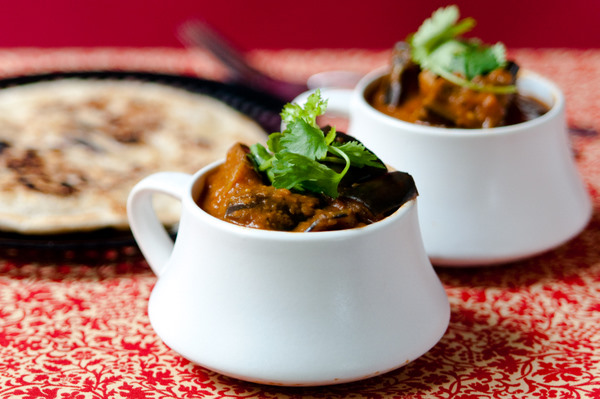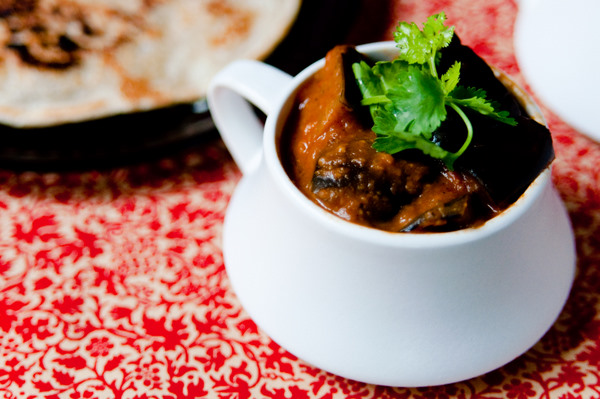I received Nigel Slater's Tender for my birthday in December - and it has quickly become one of my favourite cookbooks. Every time I read a bit of it, it makes me want to eat and grow vegetables! The book is set out alphabetically, with each chapter dealing with a different vegetable in the garden and in the kitchen. Admittedly, I am biased about this book because Nigel Slater is already one of my favourite food writers. I adore the way he writes about food and even the recipes in the book are interesting reading. I also particularly love the photos of his small but productive London garden over the four seasons. Oh, to have a garden that looks like that!

Aubergine is one of the first chapters in the book, and recently I followed the recipe for a spiced aubergine stew and - it was amazing! The stew was spiced with cardamon and coriander seeds, perfect because I love those flavours. There was also a sweetness from the tomatoes, followed by the creaminess of the coconut cream and then lastly a real hit of chilli heat. The aubergine was meltingly soft. We ate the stew with basmati rice and it was delicious.
It's one of those recipes where you definitely want whole spices to grind yourself. The spices smelt amazing. Near the end of the cooking time, I tasted the sauce before and after adding the herbs, and I think I preferred it without the herbs. The herbs seemed to make take the pow! out of the stew and make it less spicy. I will leave them out next time because I loved that chilli hit.
I reckon even people who don't normally like aubergine wouldn't mind this dish. And if you don't like aubergine? Well, I'll leave you with a quote from the book, and perhaps it will change your mind:
The aubergine seduces. No other vegetable can offer flesh so soft, silken and tender. You don't so much chew an aubergine as let it dissolve on your tongue.
I'm convinced.

Spiced aubergine stew
Adapted from Nigel Slater's Tender Volume 1
Note: I have paraphrased the recipe to make it more "instruction-y". The recipe in the book is far more chatty.
Enough for 6
1kg aubergines
2 medium onions
2 tablespoons vegetable oil
8 green cardamon pods
2 tablespoons coriander seeds
2 teaspoons black peppercorns
4 cloves garlic
a thumb sized piece of ginger, peeled
2 rounded teaspoons ground turmeric
2 x 400g can of diced or whole tomatoes
1 x 400ml tin of coconut cream
water
4 small, hot red chillies, finely chopped
a small bunch of mint (I would suggest leaving this out)
a small bunch of coriander (again, would suggest leaving this out)
Wipe the aubergines and cut them into fat chunks (don't cut them too small). Place a colander into the sink, tip in the aubergines, and sprinkle salt over them. Let sit for 30 minutes.
Peel and roughly chop the onions. Heat the oil in a large pan over a medium heat, and add the onions, cooking until they are soft and translucent.
Meanwhile, crush the cardamon pods with the flat of a knife, and shake out the little black seeds into a mortar or spice grinder. Add the coriander seeds and peppercorns, and grind all the spices to a coarse powder.
Thinly slice the garlic and cut the ginger into thin matchsticks. Stir the garlic and ginger into the onions. Add the turmeric, ground spices and canned tomatoes.
Rinse the aubergines and pat dry. Without oil, fry them in a pan until they are starting to soften and starting to go brown, turning them as they cook. Do a small amount at a time, until all the aubergines are fried.
Add the aubergines to the onions, and add the coconut milk, chillies and a little salt. Add enough water to just cover, if necessary. Bring up to the boil, and then turn down to a low simmer and cook for about 45 minutes. Afterwards, the aubergines should be very soft but not falling apart.
Lift out the aubergines and some of the onions with a draining spoon. Boil the sauce hard for five minutes to reduce, and then puree with a stick blender (you could skip this step and just have a chunky sauce).
Return the vegetables to the pot, chop up the mint and coriander and stir in, and season with salt and pepper. Serve with rice.


